HVAC Companies Swynnerton
Find top Heating and Cooling Services in Swynnerton
Receive up to 3 AC and Heating Services quotes for your project today! Compare profiles, reviews, accreditations, portfolio, etc... and choose the best service.

Premier Heating Solutions Group Ltd
54 reviewsChaseside Drive, Unit 4 Brindley Business Park, Cannock, WS11 7GD, GBPremier Heating Solutions provide a highly qualified, reliable and comprehensive service to all customers nationwide. Professionalism and courtesy are extremely important to our business and we take pride in offering a friendly service and guidance from the moment we answer your call. Most importantly, we always treat your premises with the utmost of respect, leaving it as tidy as when we started. We use the best tools and equipment to ensure your job is carried out safely and to the highest standard.
- Services
- Why Us?
- Accreditations
- Our Team
- Gallery
Get Quote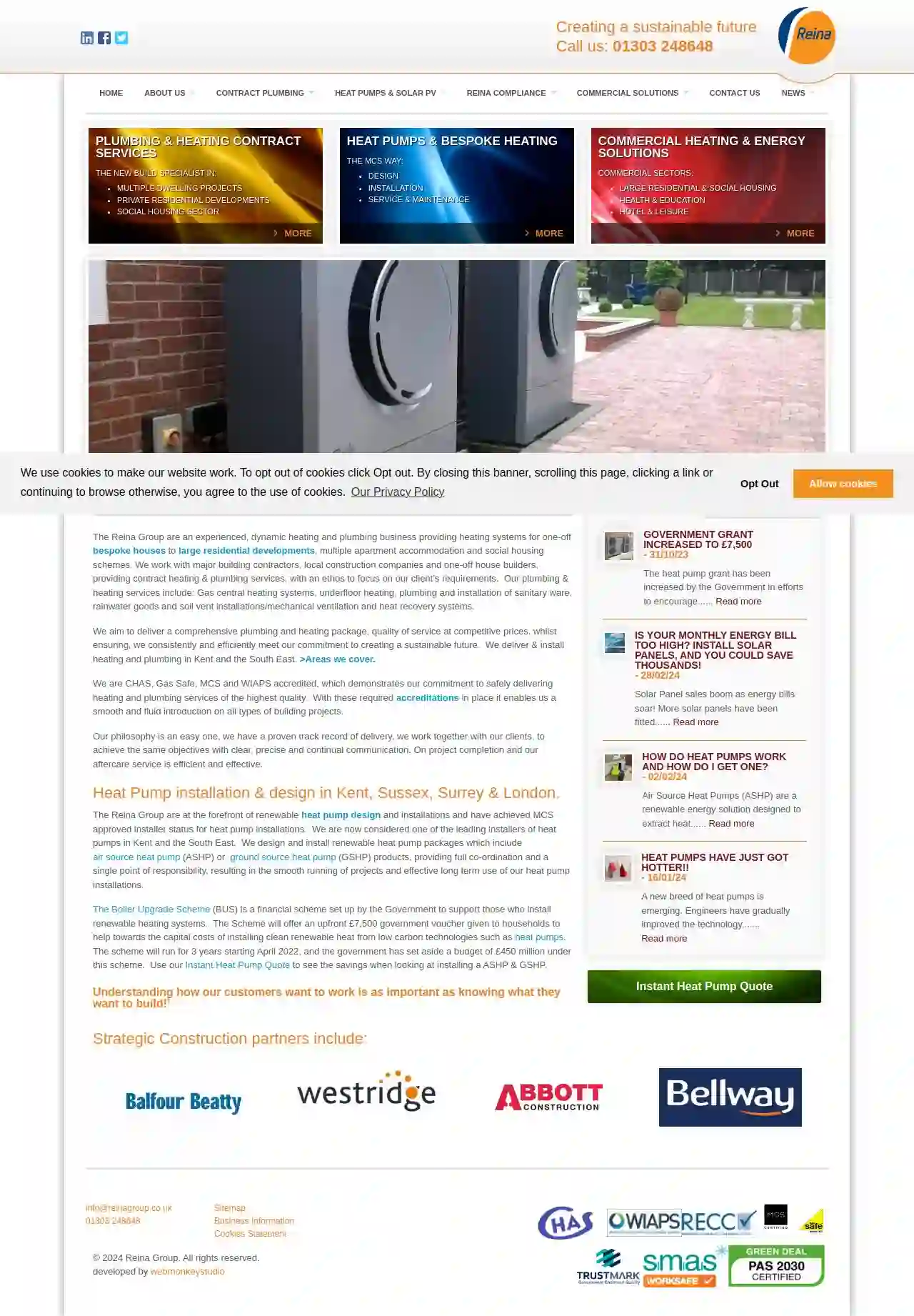
Reina Group
3.914 reviewsReina Group, Unit 1, The Old Mill, 1-3 High Street, Gravesend, Kent, KT2 7JF, GBThe Reina Group is an experienced, dynamic heating and plumbing business providing heating systems for one-off bespoke houses to large residential developments, multiple apartment accommodation and social housing schemes. We work with major building contractors, local construction companies and one-off house builders, providing contract heating & plumbing services, with an ethos to focus on our client’s requirements. Our plumbing & heating services include: Gas central heating systems, underfloor heating, plumbing and installation of sanitary ware, rainwater goods and soil vent installations/mechanical ventilation and heat recovery systems. We aim to deliver a comprehensive plumbing and heating package, quality of service at competitive prices, whilst ensuring, we consistently and efficiently meet our commitment to creating a sustainable future. We deliver & install heating and plumbing in Kent and the South East.
- Services
- Why Us?
- Accreditations
- Gallery
Get Quote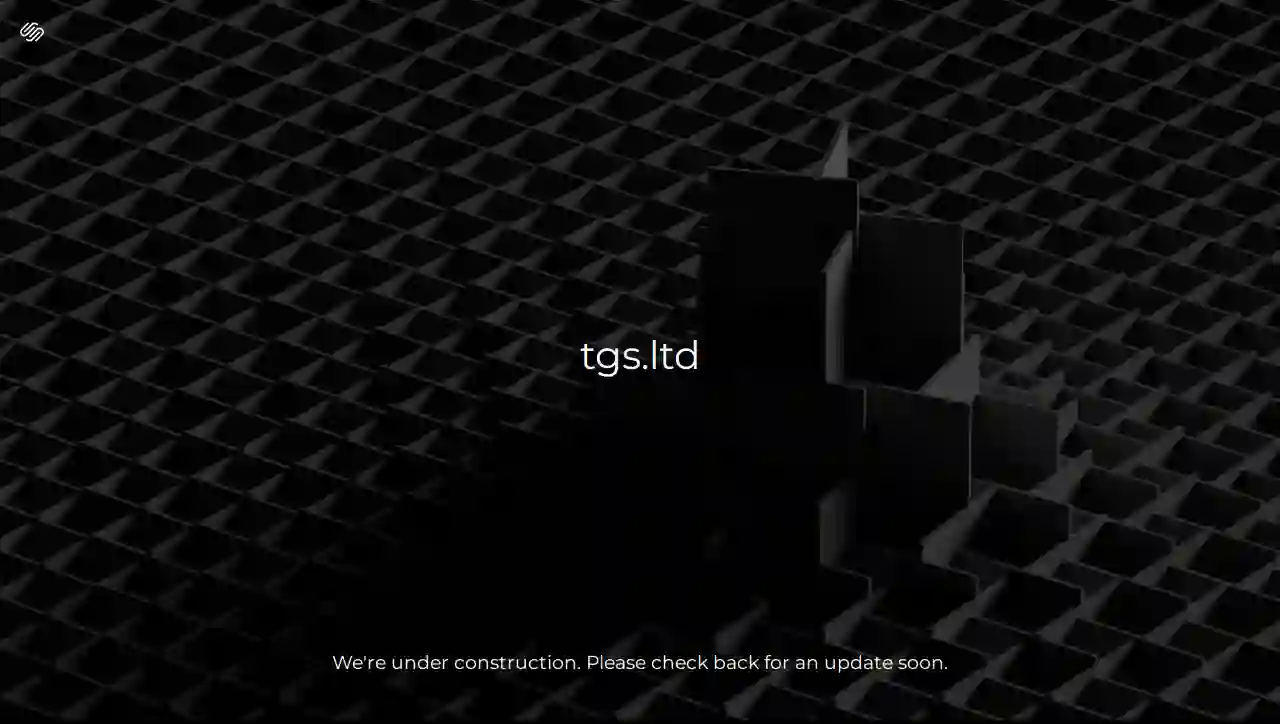
TONY GEE SERVICES LTD
Stafford, GBWe're under construction. Please check back for an update soon.
- Services
- Why Us?
- Gallery
Get Quote
React Heat
52 reviews26 Broomfield Rd, Folkestone, CT19 4DH, GBReact Heat Emergency Plumber Folkstone is your go-to for fast and specialist solutions to plumbing and heating emergencies. We understand that plumbing and gas emergencies can be serious if left unattended, which is why we offer 24/7 emergency plumbing services across the UK. Our highly-trained professionals are available immediately for same-day call-outs, ensuring you get back to normal as quickly as possible. Don't let a plumbing emergency escalate into a disaster. Contact our emergency plumbers on 01303 662044 right away. We pride ourselves on our team of experienced professionals who are dedicated to providing expert and reliable service. Our commitment to customer satisfaction is unwavering, and we guarantee the highest quality workmanship.
- Services
- Why Us?
- Gallery
Get Quote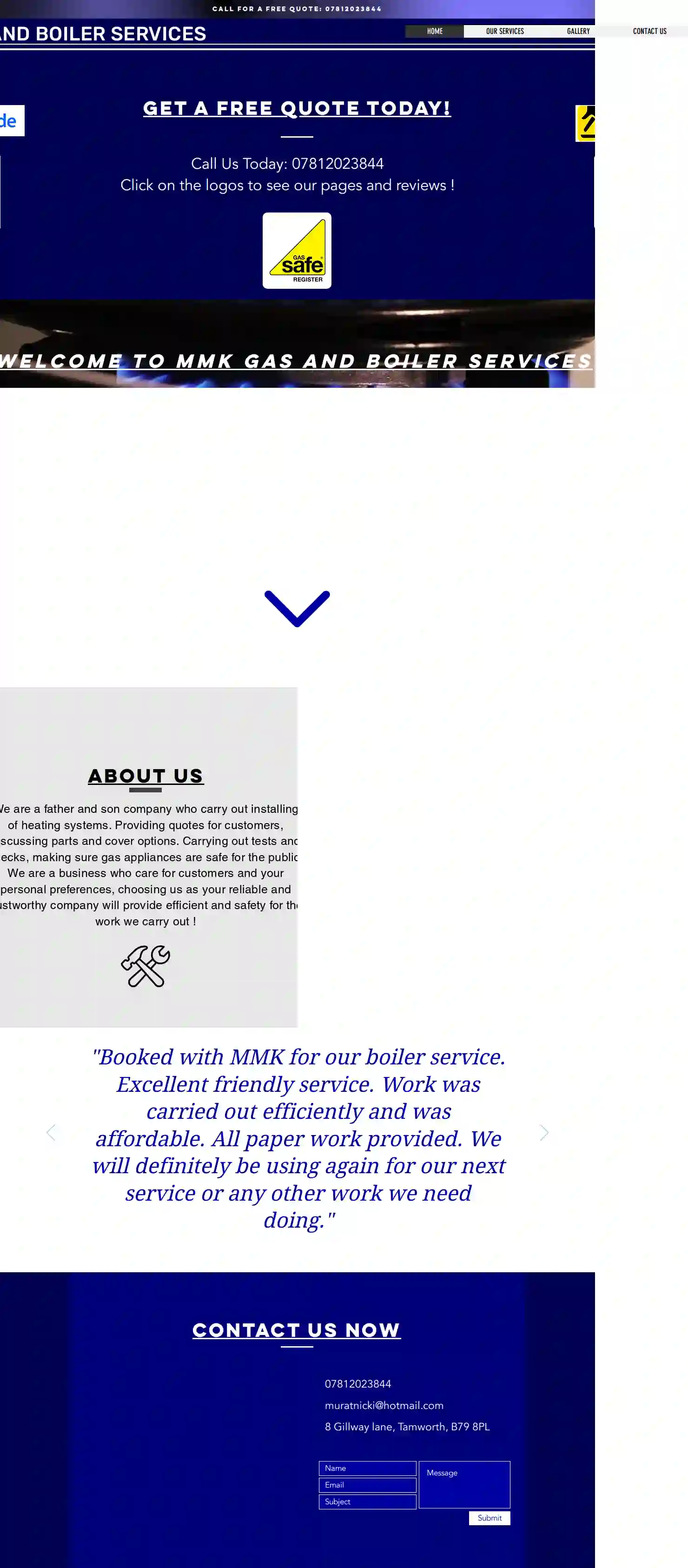
MMK Gas & Boiler Services
4.9119 reviews8 Gillway lane, Tamworth, B79 8PL, GBWe are a father and son company who carry out installing of heating systems. Providing quotes for customers, discussing parts and cover options. Carrying out tests and checks, making sure gas appliances are safe for the public. We are a business who care for customers and your personal preferences, choosing us as your reliable and trustworthy company will provide efficient and safety for the work we carry out !
- Services
- Why Us?
- Testimonials
- Gallery
Get Quote
MoreChilled
57 reviews64 Linden Crescent, Folkestone, CT19 5SB, GBWelcome to morechilled.com, serving London and the South East. We specialise in the installation, service and repair of all refrigeration and air conditioning systems in the commercial, retail and leisure industries. We have highly trained and fully qualified engineers with a wealth of knowledge. We take an honest and reliable approach to all our customers. We are Refcom registered and F-gas compliant and all our engineers hold valid CSCS cards. We can service, install and repair bottle fridges and commercial refrigeration, Cellar Cooling, Air Conditioning, Bottle Coolers, Ice Machines, Glycol Coolers, Wine Coolers, Fridges, Freezers, Cold Rooms, Glass Washers, Keg Coolers. We also rent out portable air conditioning units from just £90 ex. VAT per week. We are a rapidly growing business and specialise in all types of refrigeration and air conditioning work. Working for many years in the industry we have built a strong and loyal customer base due to our knowledge, reliability, helpful advice, honest approach and realistic pricing structure.
- Services
- Why Us?
- Gallery
Get Quote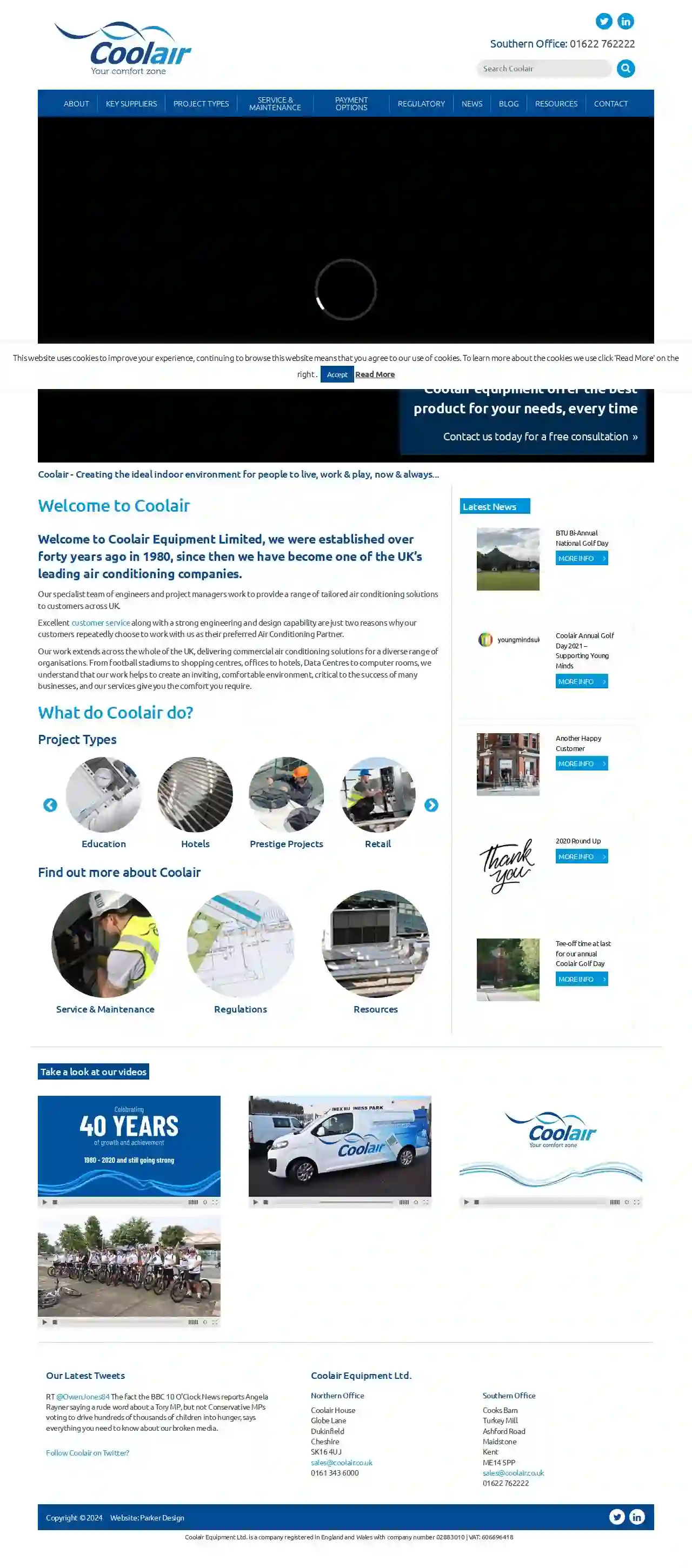
Coolair Equipment Limited
Globe Lane, Coolair House, Dukinfield, SK16 4UJ, GBWelcome to Coolair Equipment Limited, we were established over forty years ago in 1980, since then we have become one of the UK’s leading air conditioning companies. Our specialist team of engineers and project managers work to provide a range of tailored air conditioning solutions to customers across UK. Excellent customer service along with a strong engineering and design capability are just two reasons why our customers repeatedly choose to work with us as their preferred Air Conditioning Partner. Our work extends across the whole of the UK, delivering commercial air conditioning solutions for a diverse range of organisations. From football stadiums to shopping centres, offices to hotels, Data Centres to computer rooms, we understand that our work helps to create an inviting, comfortable environment, critical to the success of many businesses, and our services give you the comfort you require.
- Services
- Why Us?
- Gallery
Get Quote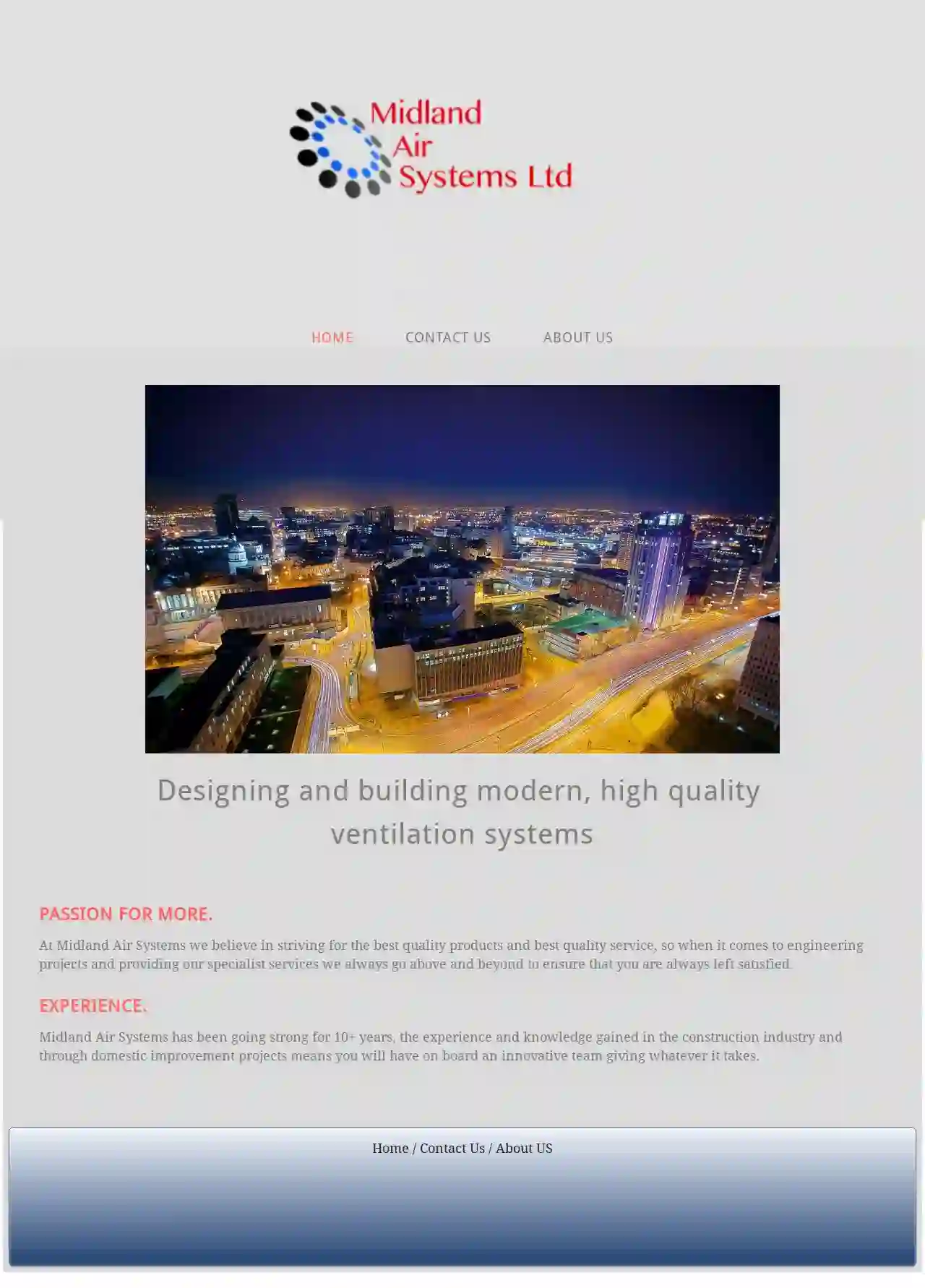
Midland Air Systems Ltd
51 reviewsUnit 2, South Staffs Freight Terminal, Lynn Lane, Shenstone, WS14 0ED, GBAt Midland Air Systems we believe in striving for the best quality products and best quality service, so when it comes to engineering projects and providing our specialist services we always go above and beyond to ensure that you are always left satisfied. Midland Air Systems has been going strong for 10+ years, the experience and knowledge gained in the construction industry and through domestic improvement projects means you will have on board an innovative team giving whatever it takes.
- Services
- Why Us?
- Gallery
Get Quote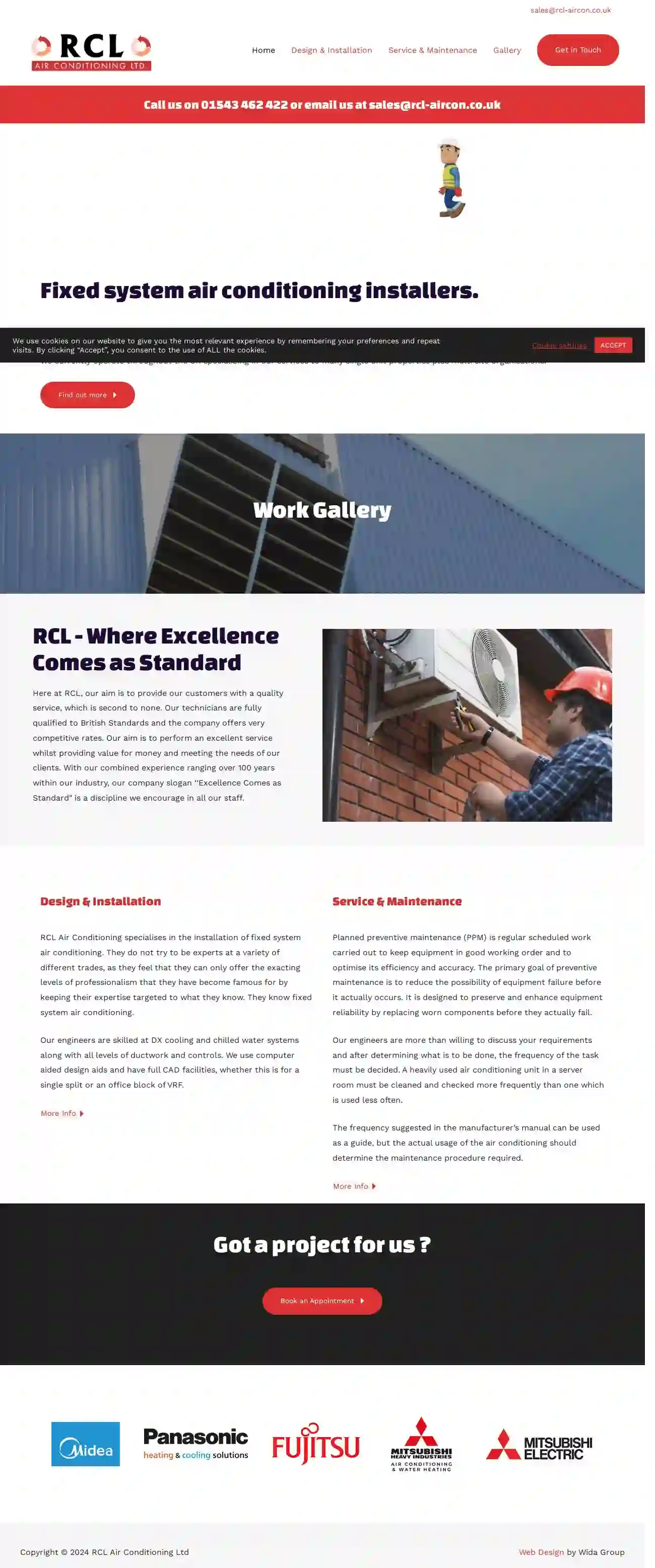
R C L Air Conditioning
54 reviewsHollies Park Road, Unit 2 Hollies Business Park, Cannock, WS11 1DB, GBRCL Air Conditioning Ltd is a fixed system air conditioning installer operating throughout the UK. With over 100 years of combined experience in the industry, our aim is to provide a quality service that is second to none. Our technicians are fully qualified to British Standards and we offer competitive rates. We specialize in the installation of fixed system air conditioning and do not try to be experts at a variety of different trades. Our engineers are skilled at DX cooling and chilled water systems along with all levels of ductwork and controls. We use computer aided design aids and have full CAD facilities. Our goal is to provide an excellent service while providing value for money and meeting the needs of our clients.
- Services
- Why Us?
- Gallery
Get Quote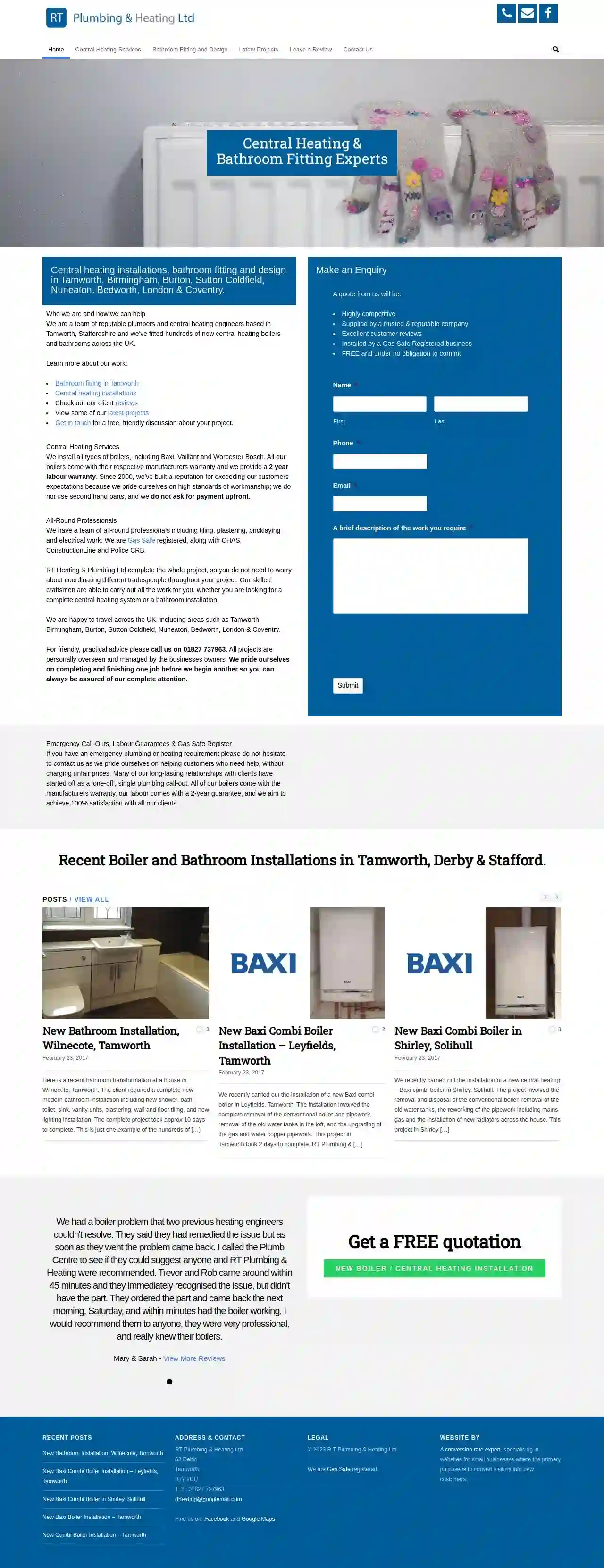
RT Plumbing & Heating Ltd
4.86 reviews63 Deltic, B77 2DU, GBCentral Heating & Bathroom Fitting Experts Central heating installations, bathroom fitting and design in Tamworth, Birmingham, Burton, Sutton Coldfield, Nuneaton, Bedworth, London & Coventry. Who we are and how we can helpWe are a team of reputable plumbers and central heating engineers based in Tamworth, Staffordshire and we've fitted hundreds of new central heating boilers and bathrooms across the UK. Learn more about our work: Bathroom fitting in Tamworth Central heating installations Check out our client reviews View some of our latest projects Get in touch for a free, friendly discussion about your project. Central Heating ServicesWe install all types of boilers, including Baxi, Vaillant and Worcester Bosch. All our boilers come with their respective manufacturers warranty and we provide a 2 year labour warranty. Since 2000, we've built a reputation for exceeding our customers expectations because we pride ourselves on high standards of workmanship; we do not use second hand parts, and we do not ask for payment upfront. All-Round ProfessionalsWe have a team of all-round professionals including tiling, plastering, bricklaying and electrical work. We are Gas Safe registered, along with CHAS, ConstructionLine and Police CRB. RT Heating & Plumbing Ltd complete the whole project, so you do not need to worry about coordinating different tradespeople throughout your project. Our skilled craftsmen are able to carry out all the work for you, whether you are looking for a complete central heating system or a bathroom installation. We are happy to travel across the UK, including areas such as Tamworth, Birmingham, Burton, Sutton Coldfield, Nuneaton, Bedworth, London & Coventry. For friendly, practical advice please call us on 01827 737963. All projects are personally overseen and managed by the businesses owners. We pride ourselves on completing and finishing one job before we begin another so you can always be assured of our complete attention. Make an Enquiry A quote from us will be:Highly competitive Supplied by a trusted & reputable company Excellent customer reviews Installed by a Gas Safe Registered business FREE and under no obligation to commit Name* First Last Phone*Email* A brief description of the work you require* Emergency Call-Outs, Labour Guarantees & Gas Safe RegisterIf you have an emergency plumbing or heating requirement please do not hesitate to contact us as we pride ourselves on helping customers who need help, without charging unfair prices. Many of our long-lasting relationships with clients have started off as a 'one-off', single plumbing call-out. All of our boilers come with the manufacturers warranty, our labour comes with a 2-year guarantee, and we aim to achieve 100% satisfaction with all our clients.
- Services
- Why Us?
- Accreditations
- Testimonials
- Gallery
Get Quote
Over 12,692+ HVAC Contractors in our network
Our HVAC experts operate in Swynnerton and surrounding areas!
HVACCompaniesHub has curated and vetted Top HVAC Companies in and around Swynnerton. Find a trustworthy contractor today.
Frequently Asked Questions About HVAC Companies
- Regular Air Filter Replacement: Change or clean your HVAC system’s air filters regularly (every 1-3 months).
- Professional Air Duct Cleaning: Have your air ducts cleaned by professionals every few years to eliminate dust, mold, and other contaminants.
- Improve Ventilation: Ensure adequate ventilation in your home to bring in fresh air and exhaust stale air. Use exhaust fans in kitchens and bathrooms.
- Control Humidity Levels: Use a humidifier or dehumidifier to maintain optimal humidity levels and prevent mold growth.
- Clean Regularly: Dust and vacuum frequently to minimize airborne particles.
- Avoid Smoking Indoors: Smoking indoors significantly reduces IAQ.
- Use Natural Cleaning Products: Opt for natural cleaning products that don’t release harmful VOCs (volatile organic compounds).
- Monitor Indoor Air Quality: Consider using an indoor air quality monitor to track pollutant levels.
- Your home's square footage
- Your local climate
- Insulation levels
- Window efficiency
- Number of occupants
- Reduced Airflow: Noticeably weaker airflow from your vents.
- Dusty Vents: Dust accumulation around your vents.
- Increased Dust: More dust than usual in your home.
- Allergies or Respiratory Issues: Worsening allergy symptoms or respiratory problems.
- Higher Energy Bills: Your furnace becomes less efficient.
- Overheating: The system overheats due to restricted airflow.
How can I improve my home's indoor air quality?
How do I choose the right size AC unit for my home?
What are the benefits of a programmable thermostat?
How can I tell if my furnace filter needs changing?
How can I improve my home's indoor air quality?
- Regular Air Filter Replacement: Change or clean your HVAC system’s air filters regularly (every 1-3 months).
- Professional Air Duct Cleaning: Have your air ducts cleaned by professionals every few years to eliminate dust, mold, and other contaminants.
- Improve Ventilation: Ensure adequate ventilation in your home to bring in fresh air and exhaust stale air. Use exhaust fans in kitchens and bathrooms.
- Control Humidity Levels: Use a humidifier or dehumidifier to maintain optimal humidity levels and prevent mold growth.
- Clean Regularly: Dust and vacuum frequently to minimize airborne particles.
- Avoid Smoking Indoors: Smoking indoors significantly reduces IAQ.
- Use Natural Cleaning Products: Opt for natural cleaning products that don’t release harmful VOCs (volatile organic compounds).
- Monitor Indoor Air Quality: Consider using an indoor air quality monitor to track pollutant levels.
How do I choose the right size AC unit for my home?
- Your home's square footage
- Your local climate
- Insulation levels
- Window efficiency
- Number of occupants
What are the benefits of a programmable thermostat?
How can I tell if my furnace filter needs changing?
- Reduced Airflow: Noticeably weaker airflow from your vents.
- Dusty Vents: Dust accumulation around your vents.
- Increased Dust: More dust than usual in your home.
- Allergies or Respiratory Issues: Worsening allergy symptoms or respiratory problems.
- Higher Energy Bills: Your furnace becomes less efficient.
- Overheating: The system overheats due to restricted airflow.